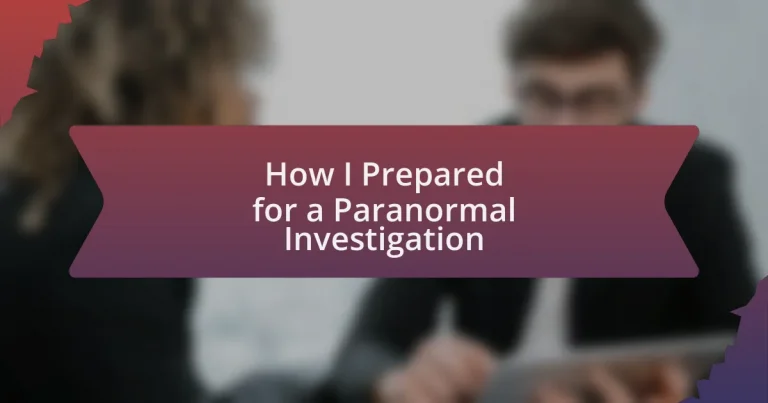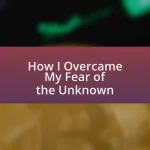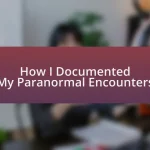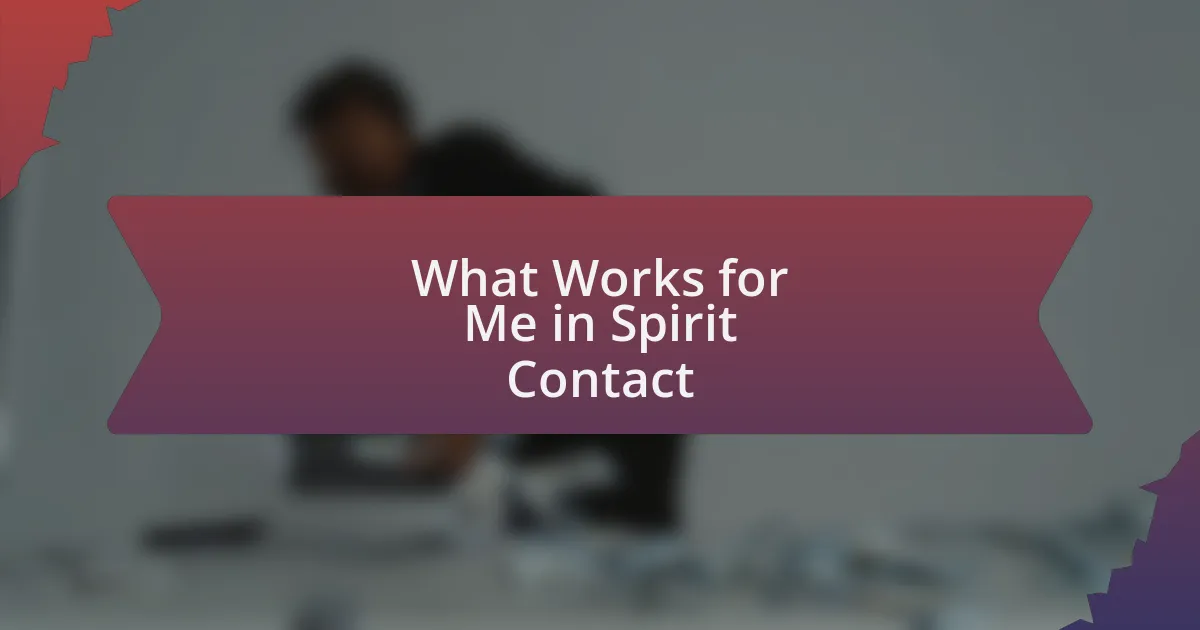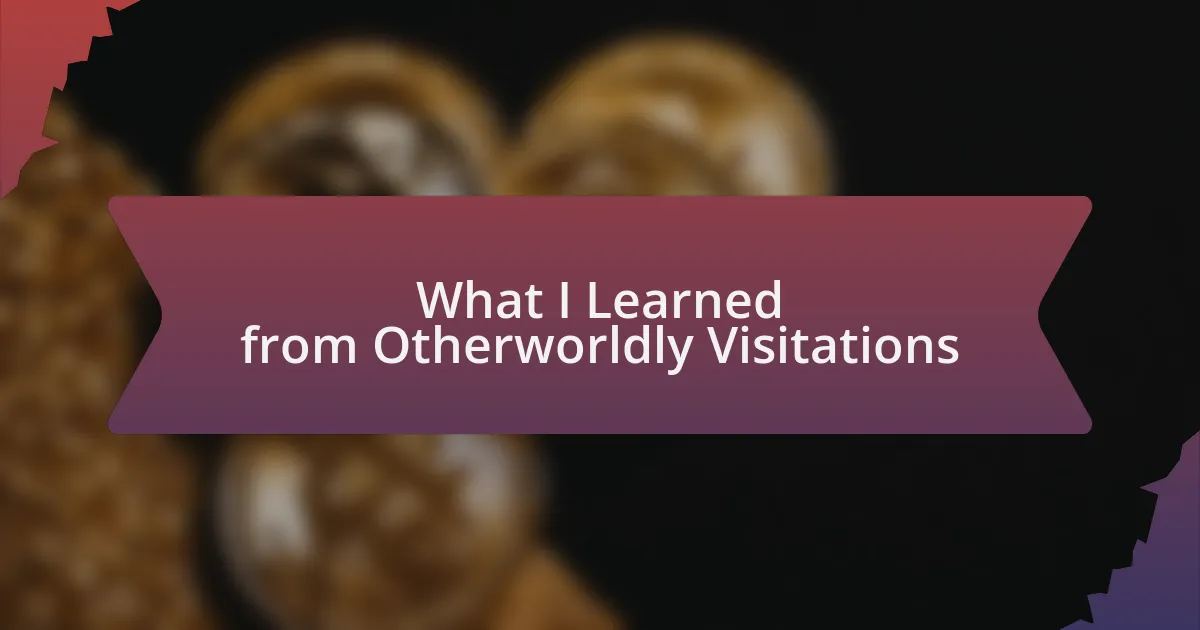Key takeaways:
- Evelyn Hartman emphasizes the importance of emotional preparation and intention-setting before paranormal investigations to enhance the experience.
- Thorough research of haunted locations provides essential context that can guide investigators and deepen their understanding of the encountered phenomena.
- Balancing the use of investigative tools with personal intuition is crucial for meaningful interactions during paranormal explorations.
- Creating a calm and respectful atmosphere prior to investigations can foster better communication with spirits and lead to more profound encounters.
Author: Evelyn Hartman
Bio: Evelyn Hartman is a contemporary author known for her evocative storytelling and rich character development. With a background in psychology, she weaves intricate narratives that explore the complexities of human relationships and personal growth. Her debut novel, “Whispers in the Wind,” garnered critical acclaim and established her as a powerful voice in modern literature. Evelyn resides in the Pacific Northwest, where she draws inspiration from the vibrant landscapes and diverse communities around her. When she’s not writing, she enjoys hiking, gardening, and spending time with her two rescue dogs.
Understanding paranormal investigations
Paranormal investigations delve into the unknown, seeking to understand phenomena that defy our conventional understanding of reality. I still remember my first investigation, walking through an old, abandoned house that creaked with age, filled with an energy that was palpable. It made me wonder: what really lingers in the places we leave behind?
The tools we use can be both fascinating and essential. I often find myself questioning how devices like EMF meters and digital voice recorders can capture the unseen—what if they are more than just instruments? Each beep and whisper during an investigation invites a rush of excitement as it could bridge the gap between our world and the unexplained.
Understanding the emotional weight of these investigations is crucial. I felt a mixture of fear and curiosity as I encountered eerie sounds in the dark, each echo whispering secrets of those who might have come before. Do we approach these investigations seeking answers, or are we drawn in by the thrill of the unknown? It’s this enigmatic push and pull that keeps me returning to the shadows, eager to unravel their mysteries.
Planning a paranormal investigation
When I plan a paranormal investigation, the first step is always choosing the right location. I remember combing through reports of haunting stories, feeling my heart race as I decided on a historic site with a troubled past. Each site has its own energy, which I find adds an undeniable layer of anticipation to the experience. What makes your heart pound when considering the history of a place? For me, it’s the unknown stories begging to be uncovered.
Next, I map out the investigation. I usually create a schedule that includes the timing and specific areas I want to explore—because the layout can influence both our findings and our emotional reactions. There was a time when I overlooked planning, thinking I could just wing it; it was a mistake that left me frustrated and unfocused. Don’t you think that having a plan aids in channeling our curiosity into something more productive?
Every investigation requires the right mindset. I’ve learned that maintaining a balance of respect and openness is key when dealing with the energies we encounter. There was one instance where I felt a heavy sadness enveloping a room, and it struck me profoundly. How do you prepare yourself emotionally for such encounters? I now take a moment to breathe, center myself, and remind myself of the importance of the experience we’re about to embark on.
Essential tools for investigators
When it comes to essential tools for investigators, I never step into the field without my trusty EMF meter. This device measures electromagnetic fields, which can indicate paranormal activity. During one investigation, I remember watching the needle spike dramatically near a dilapidated old mirror, leaving me with chills—was it just interference, or something more?
Another vital tool is a good quality voice recorder. I always bring one along to capture Electronic Voice Phenomena (EVP). There was a night when we gathered in a dark cellar, and after reviewing the audio later, we heard a whispered name that none of us had spoken. Those chilling moments of confirmation make the effort truly worthwhile, don’t you think?
Lastly, I always have a flashlight, preferably one that’s durable and bright, as darkness often hides the most interesting encounters. Once, we were in a forest area, the lights from our flashlights casting eerie shadows, when mine flickered and went out. Surrounded by darkness, the adrenaline surged—was it just the battery, or perhaps a warning from the unseen? It’s moments like these that remind me of the unpredictable nature of our investigations.
Researching haunted locations
Before heading into a potentially haunted location, I dive deep into its history. It’s fascinating to me how the past can cast a shadow over the present. For instance, while researching an abandoned asylum, I uncovered unsettling stories of past patients and treatment methods that could make anyone’s skin crawl. How can one resist the urge to explore a place so intertwined with human suffering and spectral lore?
I often find it essential to consult local lore and stories shared by those who have visited or lived near the site. On one occasion, I stumbled upon a detailed account of strange noises and sightings in a historic mansion in my town. Those personal anecdotes added a layer of authenticity to my anticipation. Can you feel the thrill of knowing you’re about to walk where someone else has encountered the unknown?
Additionally, I always look for records of previous investigations at the location. During a recent trip to an old cemetery, I found a blog detailing unexplained occurrences and even the use of specific techniques that produced results. This not only informed my own approach but also sparked a curiosity in me about my own findings. It’s kind of like piecing together a puzzle—has anyone else seen what you hope to discover?
Preparing mentally for investigations
Preparing mentally for investigations is a crucial step that I believe often gets overlooked. When I gear up for an exploration, I really focus on centering my thoughts, clearing away distractions, and sometimes even practicing mindfulness. Have you ever walked into a room and instantly felt the energy shift? That’s why it’s important to approach these locations with a calm and open mindset, so you can truly connect with whatever might be there.
In my experience, I also spend time visualizing the investigation. The night before a big outing, I imagine the layout of the space and what I might encounter. I recall one investigation where I did this and found myself oddly prepared for a chilling encounter with an unseen presence. What’s wild is that having a mental picture allows me to react more instinctively when the actual moment arrives. You’d be surprised at how much this mental rehearsal can shape your experience.
I’ve learned the importance of setting intentions before heading into a site, especially when dealing with the paranormal. During one investigation, I made it a point to ask the spirits for communication, and the energy in the space felt noticeably different. What was your last intention? I find that being clear about what I seek helps me navigate the unknown with purpose and respect, ensuring I’m not just an observer but an active participant in the unfolding experience.
Personal experiences and insights
When I reflect on my past investigations, I often think about the moments that shook me to my core. There was a time in an abandoned asylum when I felt an overwhelming sense of dread wash over me, but instead of panicking, I took a deep breath and reminded myself to stay present. Have you ever had that feeling where your instincts kick in, guiding you through the darkest moments? For me, embracing those feelings rather than ignoring them is an essential part of the journey.
One memorable experience happened during an investigation at a historic lighthouse. As I sat alone in its eerie depths, I suddenly felt a rush of warmth enveloping me, as though someone was nearby, watching over. It was both comforting and chilling, and it made me realize that the energy in the space can be as diverse as the spirits themselves. In moments like these, I find that intuition becomes my best ally. What do you think guides you when faced with the unknown?
Sharing an emotional connection with the locations I visit has deeply impacted my insights. During one investigation, I felt a profound sadness as I learned more about the stories attached to the spirits present. It reminded me that beneath the surface of the paranormal lies a rich tapestry of human experience—joy, grief, and everything in between. By acknowledging these emotions, I can engage more deeply, not just as an investigator, but as a fellow traveler in an ongoing narrative. Have you ever felt that kind of connection during an investigation? It can truly transform the way you perceive the supernatural.
Tips for a successful investigation
When preparing for a paranormal investigation, one key tip is to always understand the history of the location. I remember a time when I overlooked this, heading into a site with no context. It wasn’t until mid-investigation that I realized I was missing key details that could have shaped my experiences. Have you ever walked into a place feeling lost? Knowing the backstory can deepen your understanding and guide your instincts.
Another essential tip is to trust your equipment, but don’t rely on it entirely. I once relied too heavily on my EMF meter, only to find that it gave false readings in certain areas. Instead, I learned to balance my use of technology with my intuitive feelings. Have you considered how much you rely on gadgets versus your senses? Striking that balance can lead to more profound encounters.
Lastly, creating a calm and respectful atmosphere can significantly enhance your experience. During one investigation, I began by conducting a small grounding exercise with my team, focusing on positive intentions and respect for the spirits present. Surprisingly, it led to clearer communication and a sense of trust from the energies around us. How do you set the mood before diving into the unknown? Such intentional preparation can be the difference between a chaotic investigation and one filled with meaningful dialogue.
